Former German MP Karsten Voigt (SPD) thinks the West should take a stronger line against Russia. But journalist Wierd Duk feels that it makes more sense to try to understand Russia’s injured pride. The waning interest of America and the behaviour of European neocons such as Bildt and Sikorski have needlessly brought matters to a head. A period of détente is the only solution.
By Wierd Duk
In Bayonne, New Jersey, in a park on the waterside, stands a monument the world has forgotten about. It is a gift from Russian president Vladimir Putin and the Russian people to the people of the United States of America, donated out of solidarity and in remembrance of the victims of 9/11.
The bronze statue, which is no less than thirty metres tall, is officially called ‘To the struggle against world terrorism’. But it is popularly known as ‘The Tear of Grief’, after the gigantic teardrop of glistening nickel that hangs suspended at the heart of the monument.
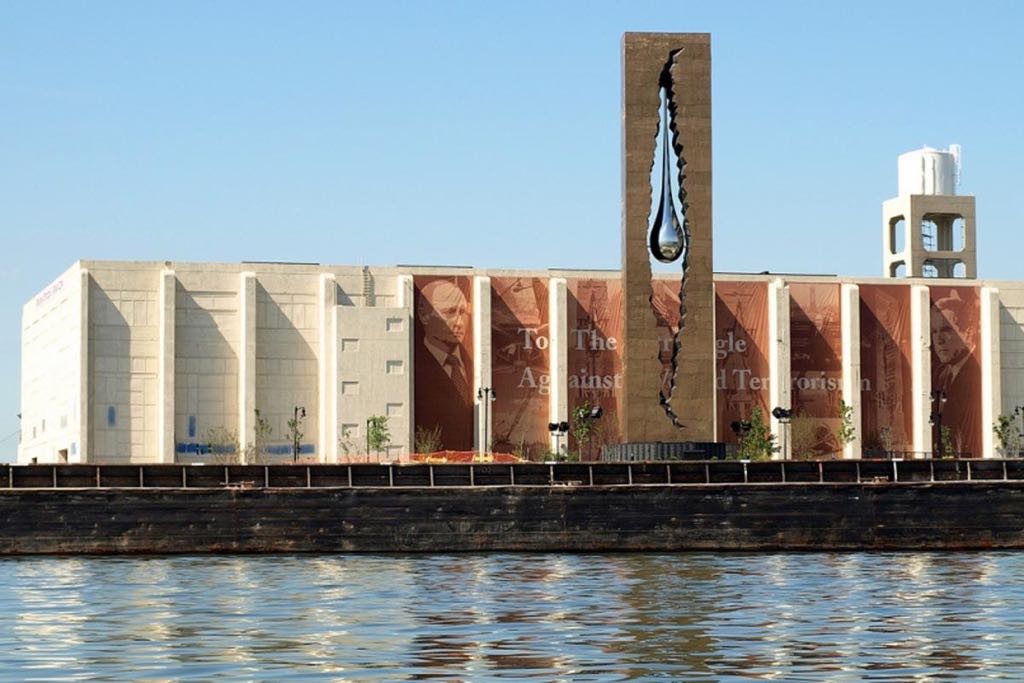 The Tear of Grief, monument for the war on terror by Zurab Tsereteli, donated by Putin to the US after 9/11
The Tear of Grief, monument for the war on terror by Zurab Tsereteli, donated by Putin to the US after 9/11
The Tear of Grief, monument for the war on terror by Zurab Tsereteli, donated by Putin to the US after 9/11
Apart from being included in the list of the ‘Ten ugliest monuments in the world’, The Tear of Grief has barely attracted any attention since the park and the monument were dedicated in two ceremonies - in September 2005 and officially a year later. President Putin gave an address at that site in 2005, with the water, the city of New York and the back of the Statue of Liberty behind him. He spoke about Russian experiences with international terrorism and assured his audience that Russia and the West would jointly defeat terrorism, just as they once did with national socialism.
One year later, it was former president Bill Clinton who spoke there, and he described how the designer of the monument (my friend) sent him a personal gift after Clinton’s mother had died: ‘A very small painted portrait’.
That painter and sculptor, Zurab Tsereteli, has been the Kremlin’s favourite artist for decades. The robust creations of the 82-year-old Georgian Russian Tsereteli always attract criticism from art experts because of their high degree of kitsch and exuberant heroism. ‘The Tear of Grief’ also met with this fate, but a different kind of aesthetics is no reason to keep quiet about a gift from Russia. Even Bayonne residents are amazed that ‘their’ memorial is so little known. ‘This is where they should lay flowers on September 11th every year’, said an elderly lady on a YouTube video. ‘Why did no one ever tell us about this place? This teardrop represents exactly how we feel.’
American lack of interest
Why go on so long about a memorial? Because the laid-back and uninterested American attitude towards this gift are symbolic of the relationship between Russia and the West. At least, that is how many Russians will view it. The perceived rejection of ‘The Tear of Grief’ is interpreted as a painful affront, and is merely one example of Russia feeling rejected since the Soviet Union fell apart.
Former German MP Karsten Voigt (SPD) previously argued on RaamopRusland that Russia, after the break-up of the Soviet Union, was able to take up its rightful place in the European and international arena - in the so-called ‘OSCE-based order’, based on the Paris Charter - but that Moscow has placed itself outside of that order by demanding special treatment. This, however, is not how the Russian people and policy makers perceive matters.
The fact that the Russian perception is so different is a startling thought. In order to investigate the possible legitimacy of this Russian parallel interpretation and explanation, we need to project our minds into the Russian version of events. Something that, I believe, happens far too rarely in the analyses of ‘Putin’s Kremlin’.
Yes, Russia has already been admitted to the Council of Europe, the G7 (which then became the G8) and the WTO, even though formally the country didn’t even meet the accession requirements. But in the architecture of the new international order, which Moscow wished to join, two institutes play a central role: NATO and the European Union. And despite the mutual cooperation in the NATO-Russia Council and the introduction of ‘four common spaces’ between Russia and the European Union, the Russians still don’t feel that they are taken seriously.
That Russia can never be a full member of NATO or the EU is obvious given all sorts of obstacles. But why did all manner of initiatives that Moscow took, despite this, to intensify cooperation with the West in terms of security and the economy meet with lukewarm responses from the Western ‘partners’? Vladimir Putin, the first head of state to call President Bush to pledge his support after the 9/11 attacks, felt increasingly ignored and eventually betrayed.
‘Near abroad’
In a number of fundamental speeches about international politics made since taking office in 2000, Putin has expressed his objections to the Western way of dealing with Moscow’s strategic interests, which are predominantly within the limits of the former ‘Soviet space’. Already in the 90s, under the government of Boris Yeltsin, Moscow had made clear that Russia considers this so-called ‘near abroad’, often home to sizeable Russian minorities, as its sphere of influence. The common objection that ‘this 19th-century thinking in terms of spheres of influence is outdated’ may be true for the European Union, but, in the eyes of many Russians, certainly not for the United States. ‘As if Americans pay any attention to international rules of law when it doesn’t suit them, Russian policy makers argue - and not unjustifiably so.
Vladimir Putin expected the West to acknowledge Russia’s strategic claims over the former Soviet Union. He had seen how NATO, in Russian eyes, had violated international law in Kosovo in 1999. He knew that the American-British invasion in Iraq had been argued on the basis of lies and he denounced the Western interpretation of the UN Security Council’s resolution 1973 about Libya in 2011. If the West, in contradiction with the international rules of law, could reserve the right to take action when Western interests were at stake, why then couldn’t the Russians formulate and defend their regional claims?
Western flirtations
Overtures to the West, by political leaders in Ukraine and Georgia for example, and the Western flirtations with these former Soviet republics, were not at all to the Kremlin’s liking. After all, Putin had plans for Ukraine: the country was to play a vital role in the Eurasian Union (EAU) he had envisaged.
And Putin simply hated the hot-tempered, pro-Western president of Georgia, Mikheil Saakashvili. When, after provocations, ‘Misha’ overplayed his hand in the summer of 2008 by bombing targets in the separatist region of South-Ossetia, the Russians struck hard and annexed two Georgian regions. ‘I’ll hang him by his balls,’ Putin said about Saakashvili in the typical blunt street language he tends to use when he gets emotional.
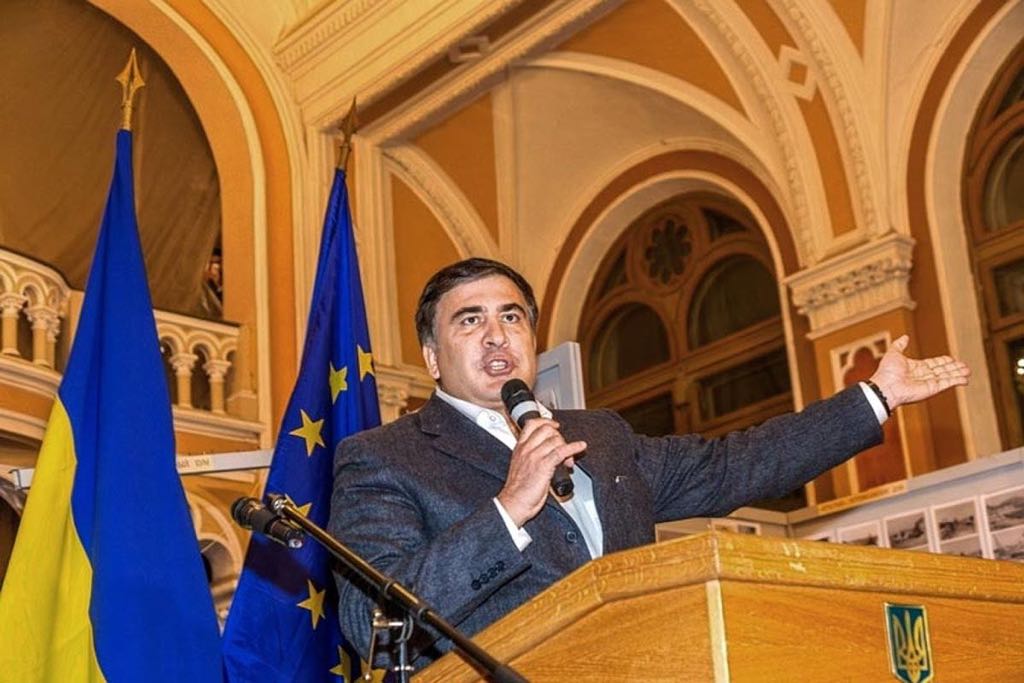
Putin hates the Georgian former president Saakashvili. He called his appointment as governor of Odessa ‘spitting in the face of the Ukrainian people’.
The West couldn’t claim it hadn’t been warned. As early as 2006, Putin had made it clear to then Secretary of State Condoleezza Rice that the Americans should stop holding out the carrot of NATO membership to Ukraine and Georgia. ‘You don’t understand what you’re doing,’ Putin said to Rice. ‘You’re playing with fire.’
Not long after this, Putin used the annual Munich Conference on Security to finally, in his words, ‘speak straight from the heart about what I really think of international safety issues’. In his speech, he presented all his grievances, all his frustrations about the West’s ‘double standards’ and his aversion to the ‘unipolar’ world that was being imposed by the United States. Here stood an exasperated Russian leader, who had come to the conclusion that it was time to bring relations with the West to a head. Present in the hall were government leaders, high-ranking military officers, diplomats and security experts: everyone who mattered in the world of international security. Putin’s speech was a bombshell.
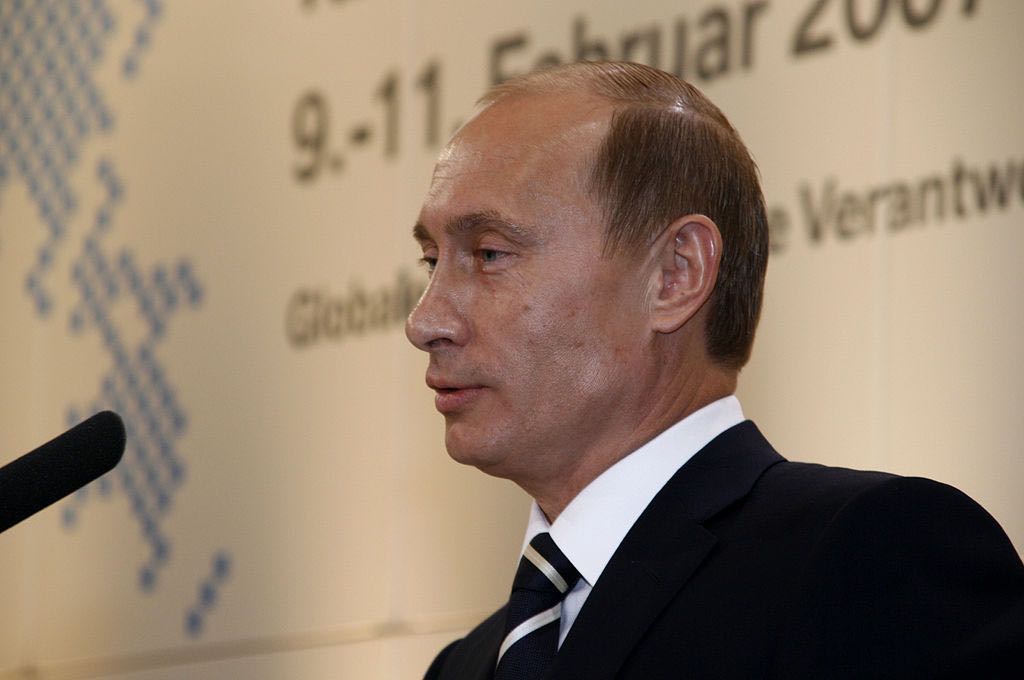 Putin speaks ‘straight from the heart’ at the 2007 Munich Conference on Security. Photo: Antje Wildgrube
Putin speaks ‘straight from the heart’ at the 2007 Munich Conference on Security. Photo: Antje Wildgrube
This was the bottom line: while Russia is lectured by the Americans about democracy, these same Americans are guilty of ‘illegal’ invasions of other countries, said Putin, thereby causing not a single country to feel safe any more and creating conditions for a new arms race. ‘New walls are being erected against us’. Putin sneered about the American ‘militarisation of space’ inspired by the White House’s plans to build a missile defence system and he called the expansion of NATO a ‘provocation’. ‘We have the right to wonder against whom this expansion of NATO is directed’, he stated. Russia, he reminded his audience, had been given guarantees back in 1990 that NATO would not expand eastwards. ‘And what have those guarantees proved to be worth?’
Eastern Partnership a bridge too far
Much has been said and written about those alleged ‘guarantees’. The most important point here is that the West has handed Russia an awful lot of sticks to beat its opponent with. The politics of misunderstandings and provocations reached a temporary low point around the Ukraine crisis, which erupted when the pro-Russian Ukrainian president Viktor Yanukovych declined to ratify an association agreement with the EU under pressure from Moscow.
This agreement was a bridge too far for Putin. Why? To understand this, we need to go back to Prague. It was here, at a European summit in May 2009, that the ‘Eastern Partnership’ (EaP) of the European Union was born.
The EaP was an attempt to bind six former Soviet republics more closely to the European Union as part of the ‘Eastern Neighbourhood’ policy. To clarify: the Soviet Union was a federation with fifteen republics: Russia, Belarus, Ukraine, the three Baltic States of Latvia, Estonia and Lithuania, Moldova, and also Georgia, Azerbaijan and Armenia and the Central Asian republics (the ‘backwaters’) Kazakhstan, Turkmenistan, Uzbekistan, Tajikistan and Kyrgyzstan.
Estonia, Latvia and Lithuania had already entered the EU and NATO in the first decade of the 2000s. Via the EaP, Ukraine, Armenia, Georgia, Moldova, Azerbaijan and Belarus were now to form alliances with Brussels.
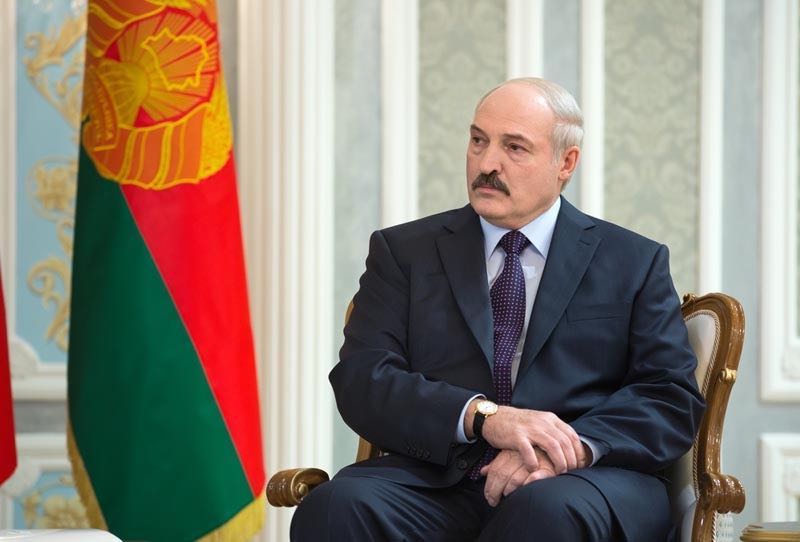
The Belarusian president Lukashenko
This list of six countries was controversial. Georgia had, after all, been subdued by the Russia armed forces the year before: this was meant to be a warning to Brussels bureaucrats and Western leaders. Vladimir Putin was apparently now also prepared to give a military response to Western ‘incitement’ in the former Soviet space. Leaders who challenge him there will be ‘hung by their balls’ or pursued ‘right into the toilets’, and be killed, as Putin, former KGB agent, once said about separatist Chechen rebel leaders, in unadulterated Russian street language. He did, in fact, exterminate every last member of this group.
Think of this what you will - especially of his language - but Washington, too, would not accept a situation in which Russia or China gave (military) support to regimes in Mexico or Canada or incited them to oppose the American government. And is Putin barbaric? Yes, surely, but what did Hillary Clinton say about the brutal murder on Colonel Gadaffi after the Western intervention in Libya? ‘We came, we saw, he died!’ She laughed hard at this and clapped her hands in delighted.
The official goal of the EaP was free trade agreements and bringing about more liberal visa legislation. But the Joint Declaration of May 2009 says: 'The main goal of the Eastern Partnership is to create the necessary conditions to accelerate political association and further economic integration between the European Union and interested partner countries'.
In this way, following the Baltic states, these former Soviet republics would also be initiated and primed to be part of the great, civilised European family. Whoever dreamed up such a project, after Putin had explained Russia’s position in the international arena time and again, was geopolitically speaking either very naive or very cunning and possibly even bent on conflict. Many analysts point out that Brussels thinks along ‘exclusively formalistic’ lines and that they had ‘no idea that the EaP would meet with so much resistance from Moscow’. I think that this representation of the situation is only partly accurate. We can accuse Radosław ‘Radek’ Sikorski and Carl Bildt of many things, but these two highly-experienced European politicians and diplomats are certainly not naive.
European neocons
Sikorski and Bildt are the initiators of the Eastern Partnership. The former was the Minister of Foreign Affairs of Poland at the time, Bildt held the same position in Sweden. Both men are known to be rabid ‘neocons’ and to harbour an intense hatred for Vladimir Putin. I can safely choose those words because they don’t hold back in their public statements - on various social media, such as Twitter - in expressing their disgust of the Russian president.
In particular the conservative Bildt has been on a roll the last few years. He never relented, lashing the Kremlin and Putin in savage tweets. At the same time, he called on the Western community to also start providing Kiev with military support against Russia. When Viktor Yanukovych chose to side with Putin, Bildt called him a ‘Quisling’ (traitor) on Twitter.
In the Swedish press, Bildt has been frequently associated with American neoconservatives such as Paul Wolfowitz, Donald Rumsfeld and Dick Cheney, who formulated the foreign policies of the Bush administration that turned out so disastrously. He is known for following the governments in Washington in important matters. When in 2014 whistle-blower Edward Snowden was granted the ‘Right Livelihood Award’, Bildt made sure that the ceremony could not take place in the building of the Swedish Ministry of Foreign Affairs.
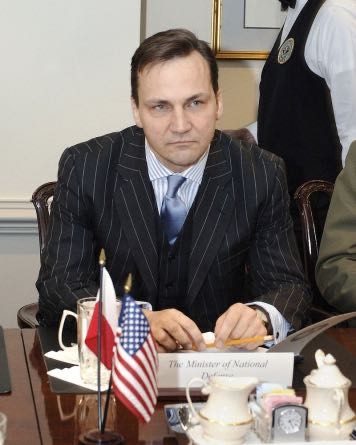 The former Polish Minister of Foreign Affairs Sikorski is a driving force behind the Eastern Partnership.
The former Polish Minister of Foreign Affairs Sikorski is a driving force behind the Eastern Partnership.
For a long time, Radek Sikorski, a Christian Democrat, was the glamourboy of Eastern-European diplomacy: destined to hold a high position in Brussels - which didn’t work out in the end due to an eavesdropping scandal that unseated him. Sikorski has a colourful personality: he was part of the dissident movement Solidarnosc, fled Poland, studied in Oxford, became a war photographer and won the World Press Photo Award in 1988 with a photo from Afghanistan. He advised Rupert Murdoch, became Junior Minister of Defence in 1992 and later of Minister of Foreign Affairs.
Between 2002 and 2005 Sikorski was a member of the American Enterprise Institute, a neoconservative think tank that included, and in some cases still includes, as its members Lynne Cheney, Dick Cheney’s wife, Newt Gingrich, Paul Wolfowitz and Ayaan Hirsi Ali.
Sikorski is married to American publicist and Pulitzer Prize-winner Anne Applebaum, who is also well-known in the Netherlands and who wrote a beautiful book about the Gulag camps, and who in recent years developed into one of the most outspoken right-wing hawks about relations with Russia and Putin.
In a notorious op-ed for the Washington Post in August 2014 Applebaum hinted at ‘total war’ in Europe. ‘Is it hysterical to prepare for total war, or is it naive not to do so?’ Of course, she saw Vladimir Putin as the instigator of such a military conflict.
Of all people, these two men, who had been tried and tested in the ‘Atlantic World’, and who were faithful devotees to the approach of Washington, the Pentagon and NATO, were early supporters of a project that was to seriously damage relations with Russia: the Eastern Partnership.
Is it any wonder that suspicious Russian policy makers asked themselves what the meaning of this was and whether EaP was really only aimed to negotiate innocent trade agreements between the six former Soviet republics and the EU? Given Sikorski and Bildt’s backgrounds and given their intensive contact with prominent neocons in the US, this is unlikely. The neocons think and act according to the notorious ‘Wolfowitz Doctrine’. It says: ‘Our first objective is to prevent the re-emergence of a new rival, either on the territory of the former Soviet Union or elsewhere, that poses a threat on the order of that posed formerly by the Soviet Union.’ When this text caused too much controversy it was replaced with a milder variation along the same lines.
Russia’s comeback
Russia had made a comeback in the international arena in the years 2000, under Putin. Putin inherited a country that had fallen into serious decline under the alcoholic and ailing president Yeltsin. Russia no longer played a part in any arena. The country had become an international laughing stock. To Putin, the former KGB officer, this situation (‘The greatest geopolitical catastrophe of the 20th century’) was unacceptable.
In a relatively short time, Putin managed to prop up Russia again, thanks mostly to high profits from oil and natural gas exports. He fought the chaos in Chechnya and elsewhere in the Caucasus with a firm hand. Putin showed no mercy to those who opposed him, even the democratic Russian opposition. He is an autocrat - not a dictator and an expansionist, as is often claimed - who tolerates no opposition, but who is loved by a significant proportion of his population because he has made ‘the Russians’ proud of their country again.
Putin gained respect from various parts of the world: from China and other BRICS countries, but there was growing mistrust of Western nations. Here, Putin's way of dealing with corrupt oligarchs, the arrest and conviction of women’s punk band Pussy Riot (the pregnant frontwoman of which once took part in a filmed ‘protest-gangbang’), the attacks on the free press and on opposition leaders, and the controversial Russian anti-gay legislation were reason enough to accuse Putin of being a contemporary Adolf Hitler.
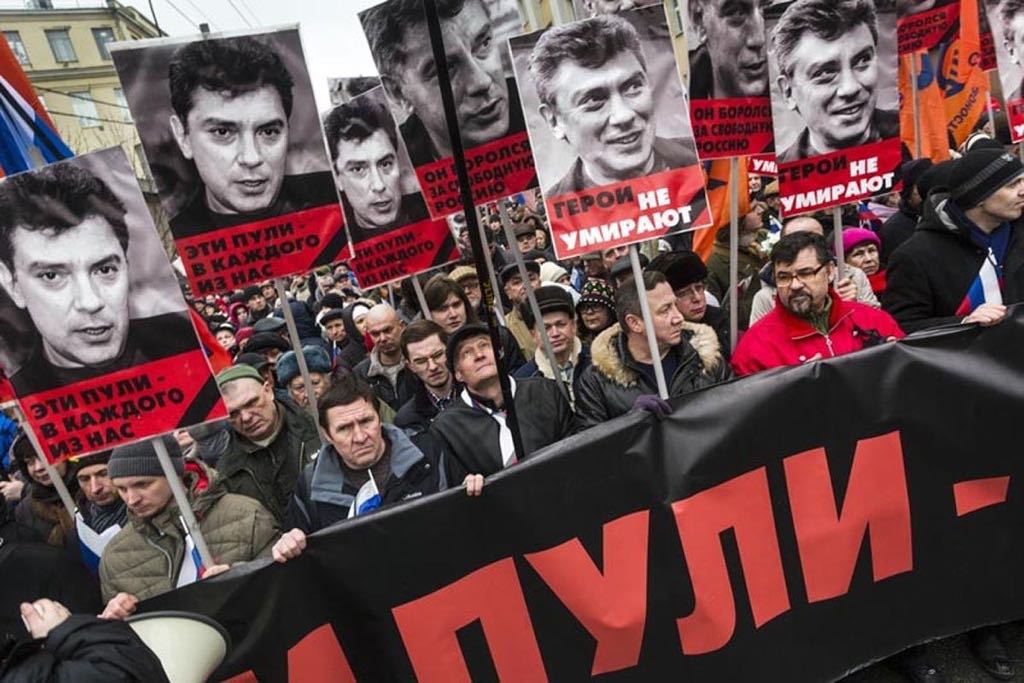
Protest march in Moscow after the murder of opposition leader Boris Nemtsov
For many Russians the true reason for the Western criticism was clear: the comeback of the Kremlin under Putin also challenged the American claim to being the world’s only super power. Even the European Union had played geopolitical hardball, with the Eastern Partnership thought up by the hawks Sikorski and Bildt. And they lost.
Now we are looking at the wreckage that is a result of the mutual misunderstanding and mutual provocations. Relations have deteriorated dramatically. Karsten Voigt is undoubtedly right to assume that the normalisation of relations between Russia and the West may take many years, if not decades. The idea that the EU should therefore invest ‘in politics that will lead to its increasing appeal inside and outside of the EU’, apparently in an effort to quell current anti-EU and pro-Russian sentiments among voters, looks like wishful thinking to me. The aversion to the EU has now after all become unprecedentedly strong as a result of the refugee crisis, but also because of the policy against Russia, which for example is looked at very critically by large parts of the German electorate.
If the West really is keen to improve relations with Moscow, then the leading politicians, opinion makers, business leaders and other prominent figures must distance themselves from the dominant view that Vladimir Putin is the bogeyman (‘He is Hitler’, in the words of Hillary Clinton) and that the West carries no blame. As we have demonstrated here, the Russians do have a reason that they see as valid to mistrust the intentions of the Western elites. It would be a good thing to point out that beam in our own eye, if only to be able to tackle the problem of international terrorism together with Putin, as the Russian president proposed on the construction site of ‘The Tear of Grief’ in Bayonne in 2005. In these dangerous times, nobody stands to win anything by entering a new, pointless Cold War with Russia.
